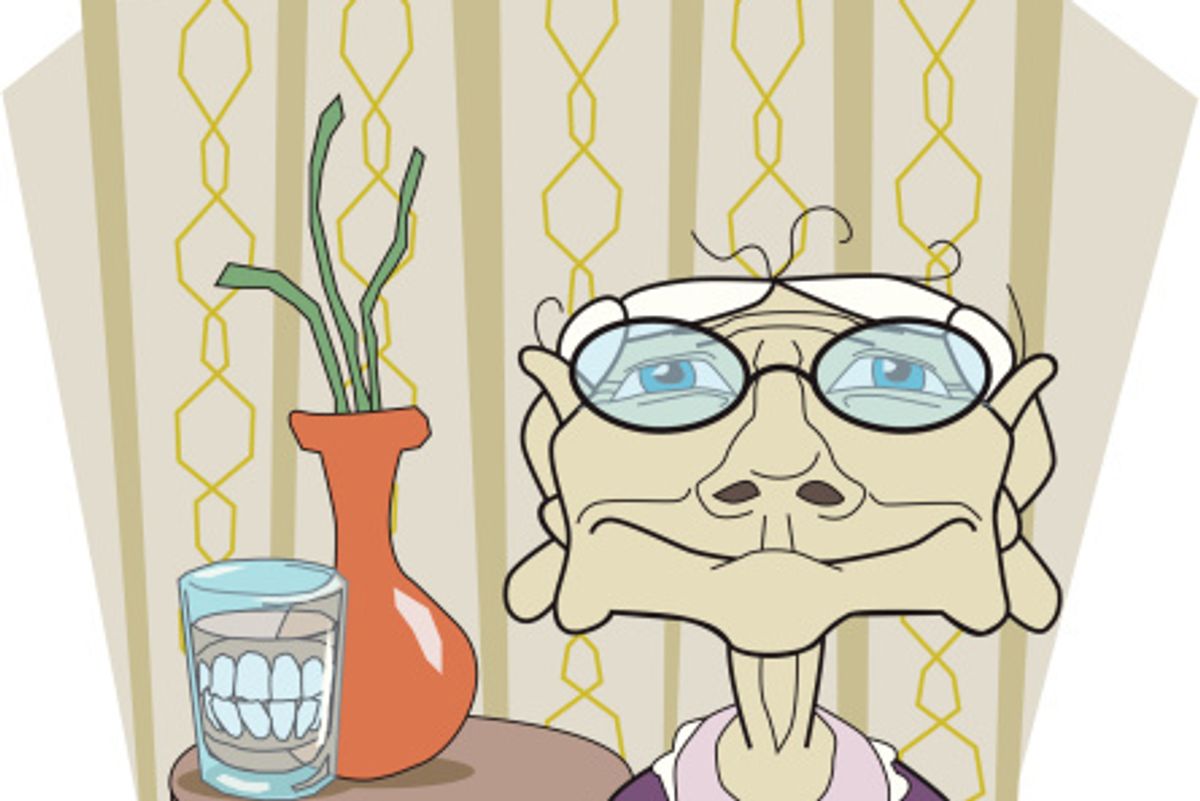This article has been archived. We will no longer be updating it. For our most up-to-date information, please visit our menopause hub here.
I'm afraid this type of question will be a perennial one, because at some point, we're all—if we're fortunate—visitors passing through this time when so many changes are sneaking up on us.
There are a couple of choice words I have for teeth and aging. (And then, of course, there are a couple more that I can't publish here.)
Time and Teeth
I recently spoke with Michael Apa, DDS, partner in the Rosenthal Apa Group in New York City.
"Your teeth start to age early on," he said. Over time, your teeth shift and you lose bone, which makes your gums recede. What's next? Women in their 40s and 50s will start to see a change in their appearance; their top teeth will look "shorter," and they'll show more of the bottom teeth.
Speaking of bottom teeth, Dr. Apa points out that those two front lower teeth (aka the lower anterior teeth) are the first to start to shift—as early as in your mid-20s. Because of the increasing pressures on your teeth—whether it is through normal wear and tear or additional forces (more on that below)—what was once balanced through Mother Nature or orthodontia is now going through a rebellion, so to speak.
As your lower teeth shift, they hit your upper front teeth when you're grinding or chewing, which in turn may start to shift and wear away, Dr. Apa explains. "If you're hard on your teeth, you'll get a worn edge on a front tooth, or one tooth will start to push forward."
Stress and Teeth
Sure, everyone feels stress (if you don't, please share your secrets), but perimenopause and menopause likely gifts you with more than the average amount. That's when so many emotionally challenging life events collide: sleep problems, the empty nest, aging parents, the changing nature of marriages and other relationships, weight gain, energy drain … need I go on?
And although you might think you're handling it like a champ during those long challenging days, odds are high that a lot of that stress will go to your jaw, which will clench and spasm, grind and gnash. At the same time, you're putting a lot of pressure on your back teeth. Those molars take the brunt of the force, and your back teeth start to fall inward, says Dr. Apa.
Tooth grinding, also known as bruxism, makes no secret of what it can do to your mouth and surrounding areas: its signs and symptoms include worn, flattened, fractured or chipped teeth, worn tooth enamel, increased tooth sensitivity, headache, earache and chronic facial pain.
And then, I wanted to say …
"Dr. Apa, thanks so much for the interview, but this is all so depressing and makes me feel like I just want to curl up and forget I ever talked to you. So I'm hanging up now."
But this is what I really said …
"Tell me more. With all these strikes against us, how can we preserve our teeth? I know you do fabulous restoration work with veneers, crowns and the like. I know you look at the whole face, not just the mouth, to figure out how to balance out facial features that are affected by the structure of our teeth. You explained to me that most of us favor one side over the other when we chew, and this builds up the musculature on one side of the face over the other, making one half of the face 'overpronounced.' Really good aesthetic dentistry, you said, figures out where those strong and weak sides are and figures out a new position for your teeth to counterbalance those asymmetries."
But what if someone can't afford cosmetic dentistry?
The best way to control aging teeth and subsequent problems is with prevention. Sounds obvious, but it's true.
Dr. Apa's Tips for Preserving What You Already Have
- Since most people don't brush their teeth effectively, use an electric toothbrush. This puts more control into the hands of the user.
- If you wear braces, wear a retainer after the braces are removed. Teeth will always want to move back to their original position based on your musculature. Rather than fit you for a retainer, some orthodontists will bond a metal wire onto the backs of your upper or lower front teeth.
- Practice good personal oral hygiene. That means brushing for two minutes after every meal and flossing and rinsing twice a day.
- Talk to your dentist about your specific problems to figure out the right product for you. There are so many types of products and so many types of patients. Over-the-counter products can help, but they can also hurt. There are toothpastes that lighten, toothpastes for sensitive teeth, toothpastes for heavy stainers and more. No longer can you rely on a one-size-fits-all solution for oral care.
- Consider increasing your number of professional in-office cleanings to twice or three times a year. As gums recede, there's a larger area where food particles can get stuck. In turn, more plaque forms and the rate of decay can increase.
- If you have restorations like fillings, veneers or crowns, have them checked periodically. They do not last a lifetime—their average life span is seven years.
- Get fitted for a night guard. Anyone who has stress in their lives (and who doesn't?) will tend to clench or grind their teeth in their sleep.
You might also want to read:







